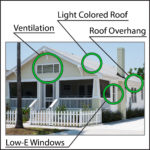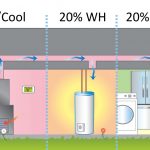Building Science Basics
 Understanding how buildings interact with the environment is important to improving energy use. If you’re new to this science, read through our easy to understand building science primer.
Understanding how buildings interact with the environment is important to improving energy use. If you’re new to this science, read through our easy to understand building science primer.
Learn More: Building Science Basics
Commercial Buildings
 From schools and large office buildings, to the shop around the corner, commercial buildings can be improved to be more energy efficient. Check out our section devoted to commercial and institutional buildings and start saving money at your business.
From schools and large office buildings, to the shop around the corner, commercial buildings can be improved to be more energy efficient. Check out our section devoted to commercial and institutional buildings and start saving money at your business.
Learn More: Commercial Buildings | HVAC Systems FAQ
How to Reduce Energy Costs in Existing Homes
 Energy use in most Florida buildings can be cost-effectively reduced by at least 15-30%, saving owners thousands of dollars over the life of their buildings. With skill, building energy use can be reduced by as much as 50% if the most efficient technologies are employed in new buildings or where existing buildings are very inefficient.
Energy use in most Florida buildings can be cost-effectively reduced by at least 15-30%, saving owners thousands of dollars over the life of their buildings. With skill, building energy use can be reduced by as much as 50% if the most efficient technologies are employed in new buildings or where existing buildings are very inefficient.
Total annual electric and gas energy use typically falls into four categories: heating and cooling, water heating, kitchen laundry, and lighting and plug-ins. Utility bill costs the average Florida homeowner five percent of their total annual after-tax income. Floridians are currently paying about 12 cents per kilowatt hour (kWh) for electricity. Without close monitoring, electrical use can easily push utility costs over $150 per month.
Learn More: How to Reduce Energy Costs in Existing Homes – Priorities
Windows

Are you shopping for new residential windows? Here’s what you should know.
Learn More: Windows
Thinking About Buying a Home?
 If you’re thinking about buying a home, consider getting an energy rating. Before you sign a contract, learn more about home energy ratings. Like a miles-per-gallon sticker for your car, energy ratings give new and existing home buyers a marketplace yardstick that measures the benefits of energy efficiency.
If you’re thinking about buying a home, consider getting an energy rating. Before you sign a contract, learn more about home energy ratings. Like a miles-per-gallon sticker for your car, energy ratings give new and existing home buyers a marketplace yardstick that measures the benefits of energy efficiency.
Download the “Thinking About Buying a Home” brochure that explains the benefits.
Where Can I Find a Home Energy Rater or Blower Door Tester?
![]()
- Florida FSEC-Certified HERS Residential Raters
- Florida FSEC-Certified Blower Door Testers
- Nationwide RESNET Professional Member.
What is a Home Energy Rating?
 Similar to a miles per gallon (mpg) rating for your car, a home energy rating grades the energy efficiency of your house. This value is calculated using the Home Energy Rating System (HERS), developed by Residential Energy Services Network (ResNet). An energy-efficient home has lower electricity bills and you create a smaller carbon footprint. Many homes can benefit from energy-efficient improvements, some of which have a payback period of only a few months.
Similar to a miles per gallon (mpg) rating for your car, a home energy rating grades the energy efficiency of your house. This value is calculated using the Home Energy Rating System (HERS), developed by Residential Energy Services Network (ResNet). An energy-efficient home has lower electricity bills and you create a smaller carbon footprint. Many homes can benefit from energy-efficient improvements, some of which have a payback period of only a few months.
Learn More: Home Energy Ratings.
Building Research Post
![]() Read the semi-annual newsletter published by the Buildings Research Department.
Read the semi-annual newsletter published by the Buildings Research Department.
[Last Updated: 06/15/2022]